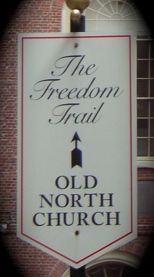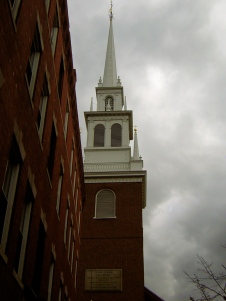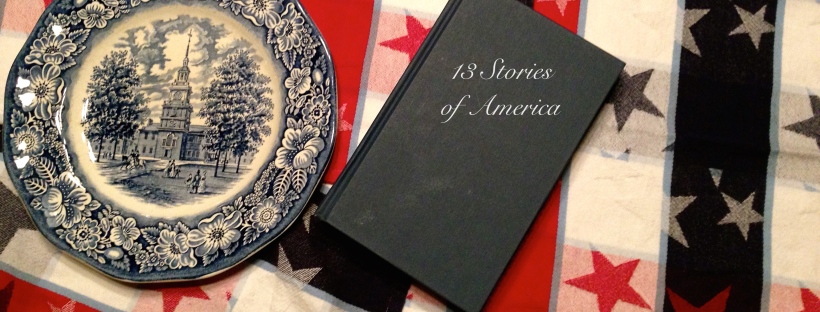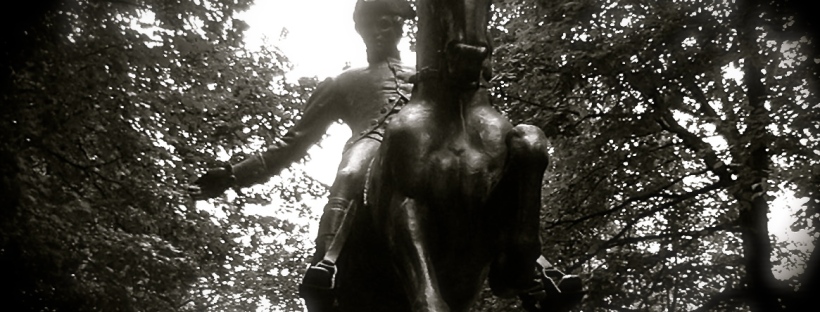It’s April 18th, and I’m so excited that it’s here! You see, it just so happens that April is National Poetry Month. (Who knew, right?) That means it’s high time I introduce you to two of my childhood friends.
First, meet Henry Wadsworth Longfellow. He was one of the “Fireside Poets” who wrote several poems that I memorized and loved to recite when I was in school. (Ok, you might hear me quoting them yet!) “The Children’s Hour” and “The Village Blacksmith” became two of my favorites, but another poem is oh-so apropos for today because one of it’s lines says, “On the eighteenth of April…”
Do you know which poem has that phrase? The first two lines will give you a clue:
Listen, my children, and you shall hear
Of the midnight ride of Paul Revere,
There you go! The multi-page poem “Paul Revere’s Ride” commemorates the daring deeds of an American Patriot named Paul Revere who warned the people of Lexington and Concord that the British were coming to capture both the Patriot leaders Sam Adams and John Hancock and the Patriot supply of gunpowder. His successful “midnight ride” began on April 18th in 1775 – 240 years ago today!
If you’ve never read the poem, do give it at least a quick look today. Can you hear the rhythm?
The muster of men at the barrack door,
The sound of arms, and the tramp of feet,
And the measured tread of the grenadiers
Marching down to their boats on the shore.
Can you see it on the screen of your imagination?
And lo! as he looks, on the belfry’s height,
A glimmer, and then a gleam of light!
He springs to the saddle, the bridle he turns,
But lingers and gazes, till full on his sight
A second lamp in the belfry burns!
A hurry of hoofs in a village street,
A shape in the moonlight, a bulk in the dark,
And beneath, from the pebbles, in passing, a spark
Struck out by a steed flying fearless and fleet:
Obviously, I love this poem. However, dear old Longfellow practiced prolific poetic license. For example, the “one if by land, two if by sea” signal was meant to warn other Patriots, not Revere. He already knew when the lanterns were hung that the British were planning to come by sea.
If you’d like to know more about the true tale, one way is through an audio story called, “The Midnight Ride,” by the team at Adventures in Odyssey. I think that audio drama played a role in endearing both poetry and history to me so long ago. (Note for those who listen: Apparently, both “Old North Church” and “Christ Church” were used as names for the same church in Boston, the church with the highest steeple in the city – just perfect for showing off signal lantern lights! (1)

You can visit Old North Church along the Freedom Trail in Boston.

“Then he climbed the tower of the Old North Church…”
Beyond historicities of Longfellow’s poem, I’ve been contemplating another aspect of it: For much of the world, Revere’s midnight ride is all they know of him – if that. How much we miss! There is so much more to his story. For example…(2)
- Did you know that Paul Revere’s father came at age thirteen to America from France because his Huguenot (French Protestant) parents wanted him to escape Louis XIV’s tyranny?
- Could it be that his father’s love of horses prepared Paul for his (several) daring rides for liberty?
- Have you heard that Revere learned his skill as a silversmith from his father and then took over the family business at age nineteen when his father died?
- Are you aware that he was a member of the Boston Tea Party?
- How about that he was chosen to design and print the new American money used to pay soldiers during the War for Independence?
All of these other glimpses of Paul Revere give us a much richer picture of him, don’t you think? He had his share of joys and heartaches, successes and failures. Many things worked together to make him the man who made that midnight ride.
I was struck by a little lesson here. Just as we see Paul Revere in one moment of his life and can think that that’s most of the story, we can think the same when we meet people day by day. How often do I meet someone for a few minutes and think I know their story? Maybe a truth to take home from Longfellow’s poem is that people’s lives are full and complex. A one-time meeting often only scratches the surface. What would we see differently if we knew more of the other chapters?
So through the night rode Paul Revere;
And so through the night went his cry of alarm
To every Middlesex village and farm,--
A cry of defiance, and not of fear,
A voice in the darkness, a knock at the door,
And a word that shall echo forevermore!
1 “Old North Church” https://www.thefreedomtrail.org/freedom-trail/old-north-church.shtml (accessed April 17, 2015).
2 Scott Ingram: Paul Revere, Triangle Histories – The Revolutionary War (Blackbirch Press, 2004).




